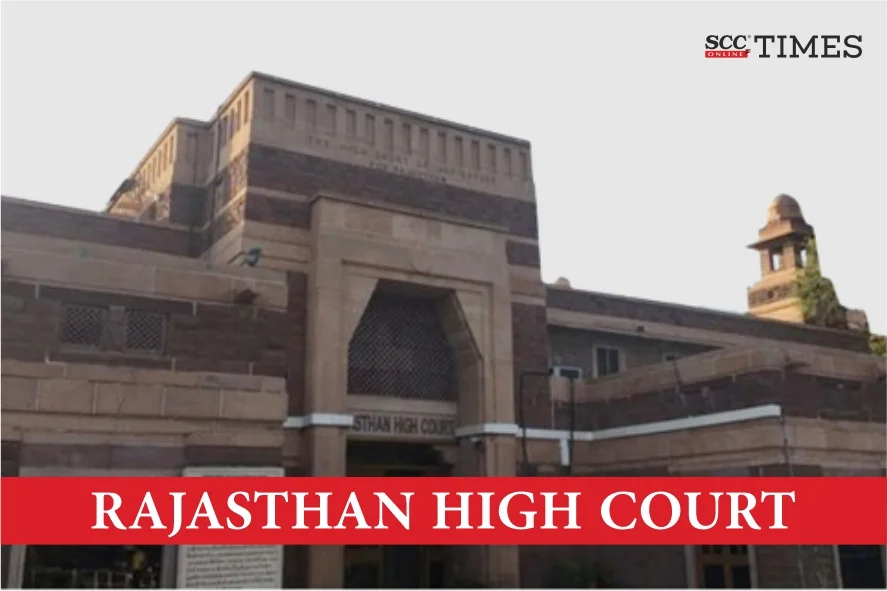Rajasthan High Court: In a writ petition seeking quashment of three FIRs alleging rape on false promise of marriage, a Single-Judge bench of Kuldeep Mathur, J., refused to quash the FIR and held that FIRs disclose prima facie material supporting allegations of rape and deceit, particularly involving false promises of marriage, therefore should not be quashed prematurely.
Factual Matrix
In the instant matter, the petitioner filed petitions seeking quashment of FIRs alleging rape on false promise of marriage—
FIR No. 115/2024 — Lodged by complainant ‘S’ alleging that the petitioner repeatedly established physical relations with her on the false assurance of marriage. After she attempted suicide, he deceitfully got a live-in agreement executed without her consent.
FIR No. 76/2024 — Lodged by complainant ‘A’, stating that the petitioner induced her into a sexual relationship by falsely promising marriage, later threatened to release objectionable content when she protested.
FIR No. 50/2025 — Alleged that petitioner and his father lured ‘S’ into accompanying them under a false promise of marriage and conspired to sexually exploit her.
Parties’ Contentions
The petitioner argued that there was a significant delay in lodging the FIRs, with no satisfactory explanation. It was asserted that the relationships were consensual, intermittent, and sustained over a long period. The petitioner emphasised on the lack of prima facie case under Section 376 IPC as per earlier negative final reports prepared by the police in FIRs 115/2024 and 76/2024. It was contended that subsequent conclusions by new Investigating Officers holding the offences to be proved are dubious and inconsistent with prior findings. It was alleged that the complainants are close friends, and they are attempting to extort money and tarnish the petitioner’s reputation.
However, the respondents argued that complainants’ consent is vitiated by false promises of marriage, making sexual relations non-consensual under law. It was asserted that a live-in agreement is a deceptive document which was obtained by fraud. It was argued that investigation has revealed sufficient material to proceed, and that FIRs disclose cognizable offences, i.e., FIRs alleging rape on false promise of marriage.
Court’s Observation
The Court noted that the inherent power under Section 482 of the CrPC1 for quashment of FIR is to be used sparingly with circumspection and that too in the rarest of rare cases and not in routine, especially when cognizable offences are disclosed, i.e., FIRs alleging rape on false promise of marriage.
The Court referred to State of Haryana v. Bhajan Lal, AIR 1992 SC 604, to discuss the categories of cases where quashment of FIR may be justified, including where allegations even if taken at face value do not disclose a cognizable offence or are so inherently improbable that no prudent person would proceed against the accused and Neeharika Infrastructure v. State of Maharashtra, (2021) 19 SCC 401 to frame the legal threshold for quashment of FIRs.
The Court noted that in both impugned FIRs alleging rape on false promise of marriage, if accepted on face value, prima facie disclosed offences under Sections 376(2)(n) and 506 IPC. The Court remarked that, though the relationships were prolonged and intermittent, the complainants’ consent was obtained under misconception of fact, rendering it invalid under Section 90 IPC.
“The unambiguous stance of the complainants is that the petitioner with the intention to deceive the complainants to enter into physical relationship, obtained their consent under a fictitious assurance of marriage, which is not valid consent as per Section 90 IPC.”
The Court stated that the complainants’ hesitation in lodging the complaint is considered understandable in light of the embarrassment which they may have to face later on and continuous reassurances of marriage. The Court further stated that the live-in relationship document, allegedly created by deceit, further indicated a lack of bona fide intent on the part of the petitioner. The Court found that, in the light of the sequence of events, it strongly indicated consent was obtained under a misrepresentation of marriage intent.
“It is highly probable that the complainants of the impugned FIRs owing to the embarrassment and on being continuously promised by the petitioner that he would solemnize marriage with the complainants, did not report the matter to the police authorities as they were under a bonafide belief that the petitioner would keep his promise of performing marriage.”
The Court held that “the possibility of the petitioner obtaining consent for sexual relations from the complainants under misconception of fact cannot be ruled out… The FIRs cannot be labelled as false/frivolous…”
Court’s Decision
The Court dismissed the SB Criminal Misc. Petitions Nos. 7570/2024 and 7935/2024. The Court further disposed of the SB Criminal Misc. Petition No. 2324/2025 with liberty to the petitioners to approach the Court again depending on the outcome of the negative final report, and liberty to the complainant to file a protest petition.
[Arpit Naraniwal v. State of Rajasthan, 2025 SCC OnLine Raj 2593, Decided on 03-06-2025]
Advocates who appeared in this case :
Mr. Manish Shishodiya, Sr. Adv., Mr. Deepesh Birla, Mr. Deepak Gurnani, Mr. Varun Arora, Mr. Farooq Ahmed and Mr. Ashok Kumar, Counsel for the Petitioners
Mr. Narendra Singh, PP and Mr. Ravindra Singh Bhati, AGA, Counsel for the Respondent No. 1
Ms. Khushi Upadhyay, Counsel for the Respondent No. 2
Buy Penal Code, 1860 HERE
1. Section 528 of the BNSS



